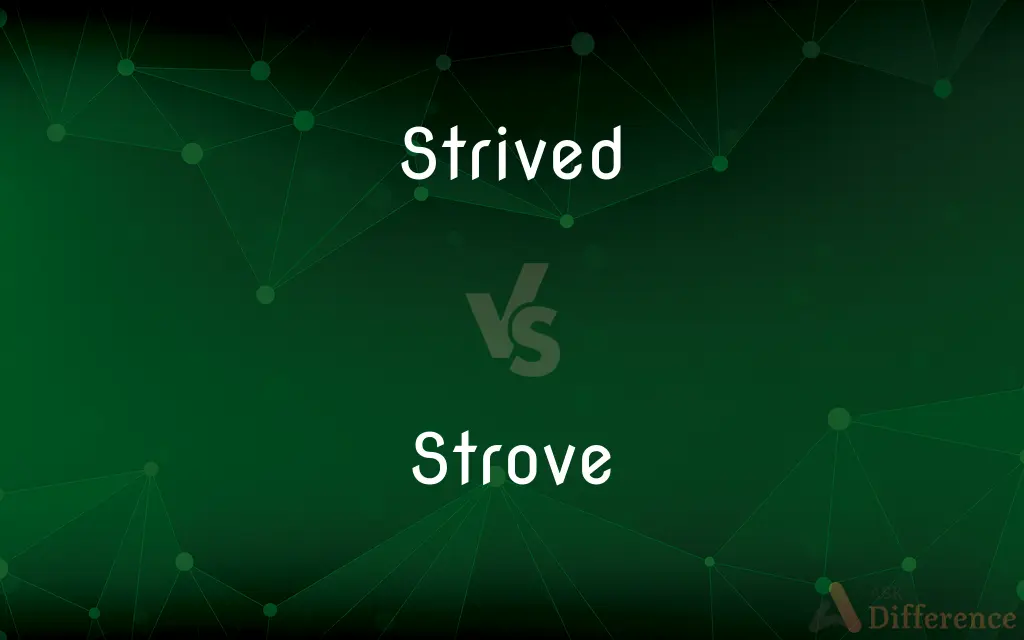Strived vs. Strove — What's the Difference?
By Tayyaba Rehman & Maham Liaqat — Updated on April 4, 2024
Strived is often used as a past tense of strive in modern contexts, while strove is the traditional historical past tense.

Difference Between Strived and Strove
Table of Contents
ADVERTISEMENT
Key Differences
Strived and strove are both past tense forms of the verb "strive," which means to make great efforts to achieve or obtain something. Strove is the traditional past tense form that has been used historically, and is still preferred by many for its classic sound. Strived, on the other hand, has gained popularity in contemporary usage and is increasingly accepted in informal contexts.
While strove gives a text a more formal or traditional flavor, strived can make language feel more modern and accessible. This choice can influence the tone and perceived formality of a sentence. For instance, in academic or literary writing, "strove" might be preferred for its traditional resonance, whereas "strived" might appear in more casual or contemporary contexts.
The choice between strived and strove can also reflect regional language preferences. In some English-speaking regions, "strove" is more commonly used and considered correct, while in others, "strived" is gaining ground. This variation means that both forms are acceptable, depending on the audience and the context of the writing.
Usage trends for "strived" and "strove" have fluctuated over time, with "strove" being the more historically established form. However, the evolution of language means that "strived" is now recognized in many dictionaries and style guides as an acceptable variant for the past tense of "strive."
Both "strived" and "strove" convey effort and determination, but their use can subtly affect the tone of a sentence. Writers might choose one over the other based on the rhythm, sound, and overall aesthetic they wish to achieve, demonstrating how language can be tailored to suit different styles and preferences.
ADVERTISEMENT
Comparison Chart
Usage
Modern, increasingly common
Traditional, historically preferred
Tone
Contemporary, informal
Formal, classic
Regional Preference
Varies, accepted widely
Preferred in traditional contexts
Formality
Informal to semi-formal
Formal
Linguistic Evolution
Example of language evolution
Historically established form
Compare with Definitions
Strived
Made great efforts to achieve or obtain.
She strived to improve her skills every day.
Strove
Exerted oneself vigorously to achieve something.
She strove to overcome the obstacles.
Strived
Exerted oneself to do or achieve something.
He strived to find a solution to the problem.
Strove
Made a significant effort towards an aim.
He strove to become the best in his field.
Strived
Aimed or aspired to a certain standard.
The team strived to maintain high quality.
Strove
Attempted or tried hard to achieve something.
He strove to make a difference in the community.
Strived
Endeavored persistently.
She strived against all odds to meet her objectives.
Strove
Aimed for or pursued a goal vigorously.
They strove for accuracy in their research.
Strived
Worked hard towards a goal.
They strived for excellence in every project.
Strove
Struggled or fought bravely against something.
They strove against injustice.
Strived
To exert much effort or energy; endeavor.
Strove
A past tense of strive.
Strived
To struggle or fight forcefully; contend
Strive against injustice.
Strove
Past participle of strive
Strived
(British) strive
Strived
Striven.
Yea, so have I strived to preach the gospel.
Common Curiosities
Do "strived" and "strove" mean the same thing?
Yes, both words are past tense forms of "strive" and share the same meaning.
When should I use "strove"?
Use "strove" in formal writing or when a traditional tone is desired.
Can "strived" and "strove" be used interchangeably?
Generally, yes, but the choice may depend on the formality and tone of the context.
Which form is more common in contemporary writing?
"Strived" is becoming more common in contemporary usage, though "strove" is still widely used.
Are there instances where one is preferred over the other in literature?
"Strove" might be preferred for historical or literary texts for its traditional feel.
How does regional preference influence the choice between "strived" and "strove"?
Some English-speaking regions have a stronger tradition of using "strove," while others are more accepting of "strived."
Can the choice between "strived" and "strove" affect readability?
Yes, depending on the audience's preference and the overall tone of the piece.
Is there a difference in pronunciation?
The difference lies in the ending sounds, "-ived" vs. "-ove," but both are easily recognizable.
Is "strived" grammatically correct?
Yes, "strived" is accepted as a modern variant of the past tense of "strive."
Can using "strived" in a formal document be considered incorrect?
It depends on the style guide being followed, but many modern guides accept both forms.
Is one form more acceptable in academic writing?
"Strove" is often preferred in academic contexts for its formality.
What's the best way to decide which form to use?
Consider the tone, formality, and audience of your writing.
Has the usage of "strived" and "strove" changed over time?
Yes, "strived" has gained popularity in recent years, reflecting the evolving nature of language.
Do "strived" and "strove" have different connotations?
Not in meaning, but "strove" may convey a more classic or serious tone.
Are there any exceptions to using "strived" or "strove"?
Usage is based on stylistic and regional preferences rather than strict rules, so exceptions are minimal.
Share Your Discovery

Previous Comparison
Irreplicable vs. Unreplicable
Next Comparison
Grate vs. GreatAuthor Spotlight
Written by
Tayyaba RehmanTayyaba Rehman is a distinguished writer, currently serving as a primary contributor to askdifference.com. As a researcher in semantics and etymology, Tayyaba's passion for the complexity of languages and their distinctions has found a perfect home on the platform. Tayyaba delves into the intricacies of language, distinguishing between commonly confused words and phrases, thereby providing clarity for readers worldwide.
Co-written by
Maham Liaqat













































